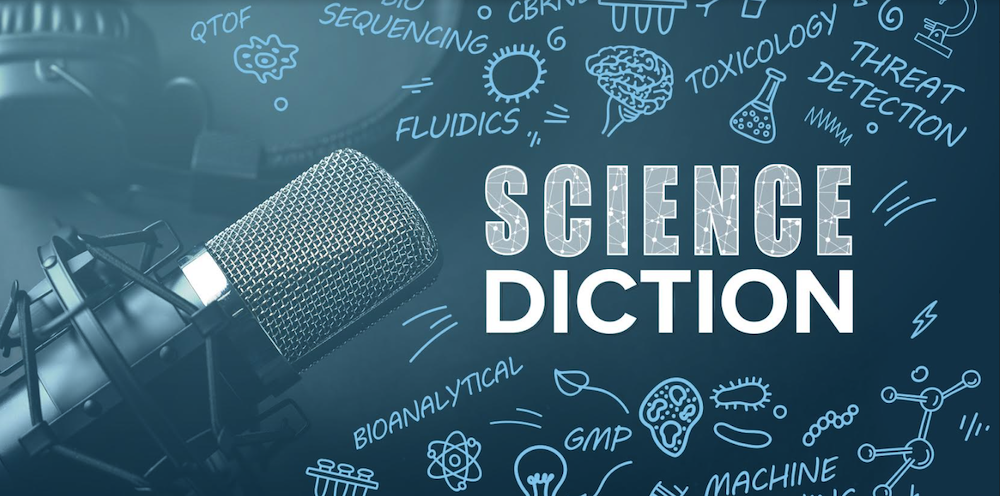Dr. Amy Manning-Boğ
Picture this: a toolkit of standardized genetic components, a canvas of principles borrowed from engineering, and the artistry of constructing biological systems with unprecedented functions.
Dr. Richard Winegar, a molecular biologist with a Ph.D. in radiation biology, boasts over two decades as chief scientist at MRIGlobal. His early focus on recombinant DNA methods illuminated radiation induced DNA damage utilizing genetically modified rodents. A pioneer in microbial forensics, he played a pivotal role in analyzing the evidence for the 2001 anthrax letters attacks, aiding the FBI in identifying the perpetrator. Today, he applies genomics and synthetic biology to diverse projects spanning diagnostics, biosecurity, and plant genetics.
Today on the show – synthetic biology – how it is like circuitry, the diseases it may help defeat, and how it is changing the landscape of diagnostics, biosecurity, and food security. I’m Amy Manning-Boğ and this is Science Diction from MRIGlobal.
Richard Winegar, Ph.D.
I would say we live at a very interesting time. A lot of technology has converged at this moment that truly have enabled synthetic biology to be realized. Some of these advances are computational power, gene synthesis, bioinformatics, CRISPR technology, next generation sequencing, and genomics and high throughput robotics. And its objective is to develop novel organisms or novel biological functions that have a useful purpose.
Dr. Amy Manning-Boğ
Why is it referred to as synthetic biology?
Richard Winegar, Ph.D.
A good question. So unlike original quote, genetic engineering that you may have heard in the past, synthetic biology actually takes a lot of its foundation from engineering and computer sciences.
And with the greater use of next generation sequencing, where we have a much bigger understanding of organisms that are very diverse, diverse from bacteria, fungi, viruses, and humans. And we started to learn how those genes in those organisms interact.
And with synthetic biology, we’ve learned how to leverage that knowledge and sort of do plug and play replacement of some of these what are called genetic circuits. So if that sounds like electronics, it really is the same idea.
Dr. Amy Manning-Boğ
So where does synthetic biology – the real nuts and bolts of it – take place?
Richard Winegar, Ph.D.
Well, I can tell you that as a synthetic biologist, I probably spend 90% of the time up front designing very complex genetic circuits. The vast majority of the time what we are doing is using an existing cell such as a yeast or E coli or plant, and modifying it with new synthetic genetic circuits, so that organism now has useful properties. And all of that is happening on my computer.
Dr. Amy Manning-Boğ
That’s what I was going to ask. What are some of the applications to human health, Richard?
Richard Winegar, Ph.D.
Sure. Over the last few years, there have been numerous applications. So if you look at the COVID vaccines, these MRNA vaccines that were developed amazingly quickly after the emergence of the pandemic. With the mRNA vaccine platform, it’s very easy to take genetic sequence data that is generated on a massive scale throughout the world as different laboratories sequenced SARS-CoV-2 infections.
And it’s possible then as new variants of concern arose, which is represented as changes within the virus’s RNA sequence, they could now use that information and plug it in to where the original strain sequence is. So the hope is that if there are other coronaviruses, for example, that you would be able to easily take advantage of the whole infrastructure that’s required for making a vaccine and by substituting this one component, whereas if on a normal vaccine, you probably are building your whole infrastructure from scratch as to how you’re going to manufacture that vaccine that meets regulatory requirements.
Dr. Amy Manning-Boğ
So this sounds like this could be utilized for multiple types of applications.
Richard Winegar, Ph.D.
Well, one of the big applications and I think it’s really just starting to emerge, is in the area of personalized medicine. So physicians now have a much better understanding of cancer cells, what kind of antigens are on the surface of cancer cells, but sometimes a given patient’s immune system doesn’t effectively fight that cancer cell. So there is a technology called chimeric antigen receptor T cell technology.
And what is done is that blood is drawn from the patient and T cells, which are a very important part of human immune response. They isolate these T cells and they will modify them so that they now contain a receptor that is specific for the cancer they have. So in some instances for common cancers you can use known cancer antigens, but in some cases for a human you will actually have the cancer cells from your body sequenced to identify antigens that are specific to your cancer.
So after modifications are made, the T cells are returned to the patient’s bloodstream. And now these sort of supercharged T cells will now begin attacking and killing the cancer cells. So to me it’s a truly amazing technology and hard to think of something more personalized than that ability to have a therapeutic that is designed specifically for you or you and the cancer that that you have.
Dr. Amy Manning-Boğ
Absolutely revolutionary. I’m curious about something else, knowing your background, Richard, what about the application to diagnostics?
Richard Winegar, Ph.D.
So funny you should ask. So yeah, so this is definitely an area of great interest to me. So CRISPR is very powerful in that the components of CRISPR can elegantly and very specifically and sensitively find infectious agents and grab on to them. So we expect that CRISPR diagnostics will be used both in big central laboratories where you’re screening thousands of people for thousands of diseases or something that you could use in the home. So I think CRISPR definitely is going to be on the horizon of an example of synthetic biology affecting our everyday life.
Dr. Amy Manning-Boğ
Though synthetic biology is still an emerging science, it may hold the key to evolving next generation diagnostics and therapeutics, serving as meaningful tools and developing sophisticated solutions to important future challenges.
Richard Winegar, Ph.D.
I think especially in these times where there’s going to be greater concern about disrupted ecosystems, climate change, drought, flood, salt infusion is that there’s going to be an ever greater need for us to have crops that are sustainable and are robust to the coming changes that are in our future. And the good thing is that with the increasingly sophisticated knowledge of plant biology and the various stressors that plants undergo and how they respond. We want to be sure that staples such as wheat and corn are really providing high nutrition.
Dr. Amy Manning-Boğ
You mentioned climate change. Can you elaborate on that?
Richard Winegar, Ph.D.
Scientists are increasingly looking at how plants might be able to serve as carbon reservoirs. So photosynthesis is a very efficient process. I mean, it’s the first solar energy that life has evolved.
Dr. Amy Manning-Boğ
Wonderful, wonderful example there.
Richard Winegar, Ph.D.
When you grow crops, you would like to be able to take advantage of that and make it more efficient and you want those crops to be very effective at the carbon sequestration and not release it over time.
So I think it’s going to be increasingly important that you look at all avenues of how you can reduce the impact of climate change and all the various ways that we’re going to need to mitigate increasing carbon dioxide levels. Synthetic biology can help with that because we really want to drive the reactions so it’s more focused on that sequestration. And that’s going to take very sophisticated knowledge of of the plant genome and its metabolic characters to achieve that goal.
Dr. Amy Manning-Boğ
Okay, years from now, I’d like for you to look into your crystal ball and tell us five, ten, 25 years down the road, how do you see synthetic biology being utilized?
Richard Winegar, Ph.D.
Well, I think within the next five years we’re definitely going to see a lot of progress in the area of CRISPR based therapeutics. In fact, I think it was this past December, the FDA approved its first CRISPR based gene therapeutic for sickle cell anemia. And I’m sure that is just the first of many applications. There are a lot of rare genetic disorders, and having the kind of capability that synthetic biology provides, I think it is within our reach to be able to address some of these orphan genetic diseases that otherwise wouldn’t have any therapeutic available.
Dr. Amy Manning-Boğ
I’m so glad you brought that up. That is absolutely groundbreaking, given that it is the first. You’re an innovative scientist. I’m putting you on the spot. What else?
Richard Winegar, Ph.D.
Yeah, there’s definitely more. So even within the next five years, I think there will also be progress in regenerative medicine. So this will be in cases where an organ or tissue has been either damaged or through aging, no longer is functioning properly. And now with modified stem cells, it will be possible to regain that function. And I think that’s also going to be very critical for neurodegenerative disorders or as well as people who suffer accidents that cause neurological damage.
Dr. Amy Manning-Boğ
Again, fascinating.
Richard Winegar, Ph.D.
I think we happen to be living at a very unique point in time where great advances in multiple areas all converge to make synthetic biology a reality.



